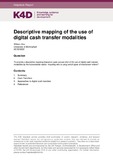Descriptive Mapping of the Use of Digital Cash Transfer Modalities
Abstract
The scale-up of Cash and Voucher Assistance is catalysing rapid change in the humanitarian sector. In particular, the use of digital payments or e-transfers in humanitarian settings has increased significantly in recent years. This rapid literature review collates evidence from academic, policy focussed and grey literature on the use of digital cash transfer modalities and provides a non-exhaustive descriptive mapping of some of the modalities used by selected donors and organisations. Cash transfers are one of the most heavily researched approaches in humanitarian aid, evaluations have established that they can be effective at achieving a wide range of aims. These evaluations have also appraised the relative utility of different modalities for delivery.
In many humanitarian crises, goods are available, but affected populations have lost the means to buy them. In such cases, cash transfers can be provided, enabling beneficiaries to choose how to use the money, giving them the dignity of choice. A digital or e-transfer is defined as the transfer of money or vouchers from the implementing agency to a beneficiary. Such transfers provide access to cash, goods and/or services through mobile devices, electronic vouchers, or cards. The term E-transfer is an umbrella term for e-cash and e-vouchers. Card-based systems allow the beneficiary to access cash (or commodities) via ATMs or merchants, possibly without the need for a bank account. Mobile transfers are a form of cash transfer occurring over mobile networks.
Modalities for digital cash transfers are diverse and multifaceted influenced by context and available technologies. Modalities may include:
Card-Based Systems
Mobile Phone-Based Systems: Mobile Vouchers
Mobile Phone-Based Systems: Mobile Money
Biometric Technology
Block Chain
Despite potential benefits, practical challenges remain for programmes that try to leverage commercially provided digital payments. In a humanitarian crisis, the priority is to get payments out to those affected as quickly as possible. Often in nascent markets where digital payments do not have a large user base or supporting agent infrastructure, the logistics of using digital payments can cause unacceptable delays.
In light of these challenges, digital payments, if used at all, are often disbursed through closed-loop systems. These are payment platforms created abroad, often for short-term use. They do not connect recipients to an account that they can use for storing, sending and receiving funds after the humanitarian response has ended.
Citation
Avis, W. (2022). Descriptive mapping of the use of digital cash transfer modalities. K4D Helpdesk Report No. 1093. Institute of Development Studies, DOI: 10.19088/K4D.2022.053DOI
10.19088/K4D.2022.053Is part of series
K4D Helpdesk Report;1093Rights holder
© Crown copyright 2022Sponsor
Foreign, Commonwealth and Development Office (FCDO)Collections
- K4D [937]

